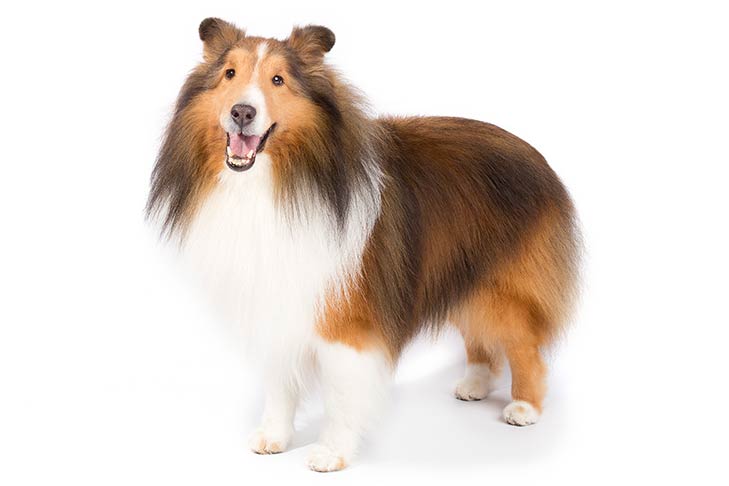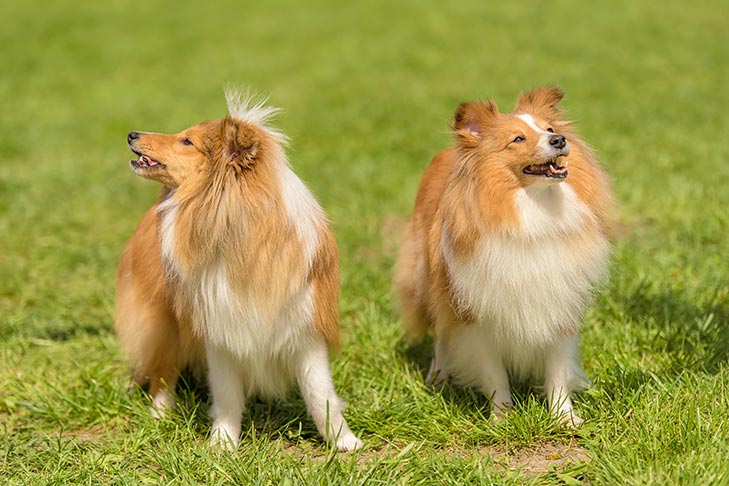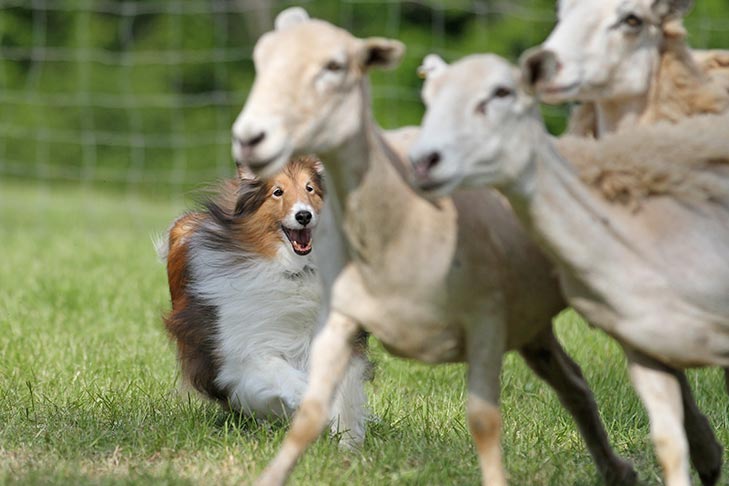Shetland Sheepdog
also known as Miniature Collie, Dwarf Scotch Shepherd (obsolete), Toonie Dog (obsolete), Shetland Collie (obsolete), Sheltie

 History
History
The Shetland Sheepdog, also known as the Sheltie, is a breed of herding dog that originated in the Shetland Islands of Scotland. Despite its name, the Sheltie is not a true sheepdog and was actually developed from crosses between the Border Collie and the Icelandic Yakkin, a small Spitz-type dog.
The Shetland Islands, located north of Scotland, have a harsh and isolated climate that requires rugged and hardy animals to survive. The Sheltie was originally bred to be a small, agile herding dog that could work in the challenging conditions of the islands.
In the late 1800s, the Shetland Sheepdog was first shown at a dog show in Lerwick, Shetland, where it was classified as a variety of the Rough Collie. However, breeders on the islands had been working to develop a distinct breed for some time, and in 1909, the Shetland Sheepdog was recognized as a separate breed by the Kennel Club in the UK.
The Sheltie quickly gained popularity in the UK and soon made its way to the United States, where it was recognized by the American Kennel Club (AKC) in 1911. The breed was initially used for herding and guarding livestock, but it also quickly became a popular show dog and family pet.
In the 1920s and 1930s, the Sheltie became known as the "poor man's Collie" due to its similarity to the Rough Collie, which was a more expensive and fashionable breed at the time. Despite this nickname, the Sheltie quickly gained a reputation as a highly intelligent and trainable breed, and it became popular in obedience and agility competitions.
The Sheltie's popularity continued to grow in the post-World War II era, and it became one of the top 10 most popular breeds in the United States by the 1970s. Today, the Sheltie is still highly sought after as a family pet and show dog, and it is recognized by kennel clubs around the world.
The Sheltie is known for its intelligence, loyalty, and willingness to please, which make it a highly trainable and obedient breed. It is also known for its strong herding instinct and its ability to quickly learn and adapt to new tasks. This breed has a long, thick double coat that comes in a variety of colors, including sable, black, blue merle, and brown. It has a long, narrow head with a strong jaw, and its ears are semi-erect and set high on the head. Its tail is long and heavily coated, and it is often carried over the back when the dog is in motion.
Breed Information
Is Shetland Sheepdog a purebred?
Purebred
What were Shetland Sheepdogs originally used for?
sheep herding
How Long Do Shetland Sheepdogs Live? What is average life expectancy for a Shetland Sheepdog? How long can Shetland Sheepdogs live?
12-14 years
The average Shetland Sheepdog lifespan is somewhere between 12-14 years, provided they aren't beset by any exceptional health issues or injuries.
Shetland Sheepdog Height & Weight
How big is a full grown Shetland Sheepdog?

| Height | ||||
|---|---|---|---|---|
| Average | 6 months | 12 months | 18 months | |
| Male | 13-16 inches (33 - 40.6 cm) | 7.0 inches (17.8 cm) | 14.5 inches (36.8 cm) | 14.5 inches (36.8 cm) |
| Female | 13-16 inches (33 - 40.6 cm) | 7.0 inches (17.8 cm) | 14.5 inches (36.8 cm) | 14.5 inches (36.8 cm) |
| Weight | ||||
|---|---|---|---|---|
| Average | 6 months | 12 months | 18 months | |
| Male | 14-27 pounds (6 - 12 kg) | 12.0 pounds (5 kg) | 17.0 pounds (8 kg) | 19.0 pounds (9 kg) |
| Female | 14-27 pounds (6 - 12 kg) | 12.0 pounds (5 kg) | 17.0 pounds (8 kg) | 19.0 pounds (9 kg) |
Do Shetland Sheepdogs get fat easily?
![]()
![]()
![]()
![]()
![]()
The Shetland Sheepdog is a breed that has an average risk of becoming obese. Daily walks and a balanced diet of quality dry dog food can help maintain a healthy weight. An active lifestyle and monitoring weight regularly is recommended.
Are Shetland Sheepdogs Hypoallergenic?
No
Unfortunately, the Shetland Sheepdog is not hypoallergenic, making it not a good choice for a dog lover who suffers from pet allergies.
What is a Shetland Sheepdog personality? What are Shetland Sheepdog dogs best known for?
Affectionate
Gentle
Lively
Responsive
Friendly
Intelligent
Playful
Are Shetland Sheepdogs heavy shedders? How Much Does a Shetland Sheepdog Shed?
![]()
![]()
![]()
![]()
![]()
Shetland Sheepdog dogs are not heavy shedders, but they will lose a significant amount of hair each year. To decrease the amount of shedding, you can regularly brush your Shetland Sheepdog. This will remove loose hair and keep his coat growing in the same direction.
What is the watchdog ability of a Shetland Sheepdog dog?
![]()
![]()
![]()
![]()
![]()
Shetland Sheepdogs are very good watchdogs. They are a vocal breed, and are wary of outsiders, so if someone approaches your home or aims to intrude, the Shetland Sheepdog is going to make sure everyone knows about it.
Breed History
Where do Shetland Sheepdogs come from?
Scotland (Shetland Islands)
What are Shetland Sheepdogs descended from?
collie
What organizations or kennel clubs recognize/register the Shetland Sheepdog breed?
American Canine Registry
American Kennel Club
America's Pet Registry
Canadian Kennel Club
Dog Registry of America Inc.
Federation Cynologique Internationale
Kennel Club of Great Britain
North American Purebred Registry, Inc.
American Canine Association, Inc.
Australian National Kennel Council
Continental Kennel Club
National Kennel Club
New Zealand Kennel Club
United Kennel Club
Canadian Canine Registry
When were Shetland Sheepdogs first bred? How old is the Shetland Sheepdog breed?
1800s
What Breed Group is a Shetland Sheepdog?
Herding (AKC:1911 & UKC)

Shetland Sheepdog Appearance
What color are Shetland Sheepdog eyes?
Blue
Brown
What color can Shetland Sheepdog nose be naturally?
Black
What color can Shetland Sheepdog coat be naturally?
Sable
Black
Blue
White
How long is a Shetland Sheepdogs coat?
![]()
![]()
![]()
![]()
![]()
The coat of a Shetland Sheepdog is longer than that of the typical dog.
How Dense Is The Shetland Sheepdog Coat?
![]()
![]()
![]()
![]()
![]()
What is the texture of the hair of a Shetland Sheepdog?
Straight
How many puppies can a Shetland Sheepdog have in a litter? How many puppies can a Shetland Sheepdog have in her first litter?
12-14 puppies per pregnancy
A Shetland Sheepdog can have a litter of 12-14 puppies on average. However, it's worth noting that the size of the litters can vary greatly. Factors that can influence litter size include the health of the mother, breeding history, and genetics.
![]()
![]()
![]()
![]()
![]()
Shetland Sheepdogs are known for their adaptability and versatility, they are capable of adapting well to a wide range of lifestyle changes and living environments. They are a highly adaptable breed, and make great companions for families and individuals of all lifestyles.

Shetland Sheepdog Health Issues
Do Shetland Sheepdogs have a lot of health problems?
![]()
![]()
![]()
![]()
![]()
The Shetland Sheepdog is generally considered to be healthy. However, like all breeds, they are susceptible to certain health issues and it is important to keep an eye out for them and address them with your veterinarian as needed.
What are the major health concerns to be aware of when owning a Shetland Sheepdog?
Dermatomyositis
Sensitive to Ivermectin
What are the less significant issues to keep in mind when it comes to Shetland Sheepdogs?
Patellar Luxation
Cataract
Progressive Retinal Atrophy
Hip Dysplasia
Collie Eye Anomaly
Von Willebrand's Disease
Deafness
Epilepsy
Hemophilia
Trichiasis
Legg-Calve-Perthes Disease
What are the occasional tests recommended for Shetland Sheepdog breed?
Eye
Hip
Hearing
Blood Test
Hip X-Rays
Dna For Vwd
Eye Examination
Physical Examination

Shetland Sheepdog Needs and Activities
Do Shetland Sheepdogs have a lot of energy?
![]()
![]()
![]()
![]()
![]()
Shetland Sheepdogs are known for their high energy levels, so if you're looking for a more low-key dog, this breed may not be the best choice.
Do Shetland Sheepdogs need socialization? How social are Shetland Sheepdogs?
![]()
![]()
![]()
![]()
![]()
Shetland Sheepdog have above average social needs compared to other breeds.They thrive in environments where they have a lot of interaction with humans and other dogs.
How much exercise should Shetland Sheepdogs get?
![]()
![]()
![]()
![]()
![]()
The Shetland Sheepdog dog requires a moderate amount of physical activity to maintain a healthy lifestyle. These breeds are ideal for people who have a moderate amount of time to devote to their pet and enjoy regular physical activity themselves. They also make great family pets as they have the energy to keep up with children and the temperament to be great companions.
How much sleep should a Shetland Sheepdog have? Do Shetland Sheepdogs sleep a lot?
![]()
![]()
![]()
![]()
![]()
Shetland Sheepdogs dogs are tend to sleep less than other breeds, but they still require adequate sleep to maintain good health.
Does a Shetland Sheepdog drool a lot?
![]()
![]()
![]()
![]()
![]()
The Shetland Sheepdog is a breed of dog that is characterized by its minimal drooling, making it an ideal choice for people who dislike drool marks on their clothing.
How much does it bark?
![]()
![]()
![]()
![]()
![]()
Shetland Sheepdog dogs bark and howl frequently, they are not a good fit for quiet homes.
Do Shetland Sheepdogs exhibit aggressive behavior to safeguard their home and territory? Do they possess a natural tendency to guard?
![]()
![]()
![]()
![]()
![]()
These dogs are known for being extremely protective and make excellent guard dogs. They possess a strong instinct to defend their territory and owners and have a high level of vigilance and alertness.
Are Shetland Sheepdogs mouthy?
![]()
![]()
![]()
![]()
![]()
What is the likelihood of a Shetland Sheepdog running away? Do they have a tendency to explore or wander frequently?
![]()
![]()
![]()
![]()
![]()
Do Shetland Sheepdog dogs have a high prey drive?
![]()
![]()
![]()
![]()
![]()
What do Shetland Sheepdogs enjoy doing? How do I keep my Shetland Sheepdog busy?
Walk, Playing fetch, Tug of war, Training, Running, Go to Beach, Go to Park, Long walks, Run After birds, Showing, Beach, Obedience, Snuggles, Soccer, Frisbee, Run, Play, Chase, Fetch, Dog Parks
What is the energy level of a Shetland Sheepdog? How much energy does a Shetland Sheepdog have?
Medium
Shetland Sheepdogs are medium-energy dogs and typically enjoy socializing and playing casual or even sustained games of chase with other dogs. They may also have occasional periods of barking or racing around the house.
![]()
![]()
![]()
![]()
![]()
How far should a Shetland Sheepdog walk each week? How many miles should a Shetland Sheepdog walk every week?
8 miles / week
There's really no limit to how far you walk your dog as long as they're comfortable. For Shetland Sheepdog, it's at least 8 miles / week. Just remember to build distance and stamina gradually over time.
How much a Shetland Sheepdog should exercise a day? How much activity does a Shetland Sheepdog need?
45 minutes
In general most Shetland Sheepdogs usually need at least 45 minutes of exercise daily. This can be spread across the day and include all sorts of high-energy activities, like walking, running and playing.
What level of grooming should be provided for a Shetland Sheepdog?
![]()
![]()
![]()
![]()
![]()
This breed is known for having high grooming needs.
How often should you brush a Shetland Sheepdog?
Weekly
Shetland Sheepdog should be brushed at least once a week. Of course you can give them more frequent brushes if you find that they are still shedding a lot
What are the most commonly used brushing tools for Shetland Sheepdogs?
Pin Brush
Dematter
Comb
Nail Clipper
Costs
How many cups of food does a Shetland Sheepdog eat?
2 cups
For an average 14-27 pound (6 - 12 kg) Shetland Sheepdog feed 2 cups daily. But, keep in mind, the amount you feed is going to be dependent on the quality of the food you are feeding.
How Much Does a Shetland Sheepdog Cost Daily?
$1.70 - $2.00 / day
The average cost of a Shetland Sheepdog is somewhere $1.70 - $2.00 per day.
How Much Does a Shetland Sheepdog Cost Per Month?
$48 - $63 / month
The average per month expenses of a Shetland Sheepdog is between $48 - $63. This makes an average of $576 - $756 per year. It will be on the higher side when the dog is still small because it will need more frequent visits to the vet, shots.
Shetland Sheepdog Characteristic
How intelligent is a Shetland Sheepdog?
![]()
![]()
![]()
![]()
![]()
The Shetland Sheepdog breed is considered highly intelligent and very easy to train.
How sensitive is a Shetland Sheepdog dog?
![]()
![]()
![]()
![]()
![]()
This dog breed is particularly attuned to its environment and the emotions of those around it. It can be easily overwhelmed by loud noises, new environments, and unfamiliar people or animals. This dog is best suited for individuals or families who are patient, gentle, and understanding of its sensitive nature. It may also benefit from a calm and stable home environment, with a consistent routine and plenty of positive reinforcement training.
Are Shetland Sheepdog dogs affectionate?
![]()
![]()
![]()
![]()
![]()
Do Shetland Sheepdog do well in apartments? Are Shetland Sheepdogs good indoor dogs?
![]()
![]()
![]()
![]()
![]()
It's not recommended to keep the Shetland Sheepdog in an apartment, but this breed make good apartment dogs as long as they get to spend a good amount of time outside of the apartment. Shetland Sheepdogs living in apartments will need plenty of physical exercise and stimulation throughout the day to remain happy and well-behaved.
Are Shetland Sheepdogs good with kids? Are Shetland Sheepdogs good around children?
![]()
![]()
![]()
![]()
![]()
Shetland Sheepdogs are kid-friendly dogs. They are good with children and excellent dogs with children if they are socialized and trained at a young age.
Are Shetland Sheepdogs good for elderly?
![]()
![]()
![]()
![]()
![]()
Are Shetland Sheepdogs good with cats? How friendly Shetland Sheepdogs are toward cats?
![]()
![]()
![]()
![]()
![]()
Shetland Sheepdogs are very cat friendly dogs. They generally make good companions for cats.
Do Shetland Sheepdog dogs get along with other dogs? Are Shetland Sheepdogs OK with other dogs?
![]()
![]()
![]()
![]()
![]()
Shetland Sheepdogs are friendly, active and loyal companions. They generally love to be around other dogs, making them a good family pet for some,
How do Shetland Sheepdog dogs interact with other pets? Are they considered pet-friendly?
![]()
![]()
![]()
![]()
![]()
Are Shetland Sheepdogs friendly with strangers?
![]()
![]()
![]()
![]()
![]()
Shetland Sheepdogs are below average friendly around strangers. Keen of eye and sharp of tongue, most Shetland Sheepdogs are very quick to announce strangers at the door. Once the visitor comes in, some Shetland Sheepdogs will be friendly and outgoing. But many others have the standoffish or suspicious towards strangers.
Do Shetland Sheepdogs like to play? Are Shetland Sheepdogs playful?
![]()
![]()
![]()
![]()
![]()
Shetland Sheepdogs have an average level of playfulness. The Shetland Sheepdogs, like other dogs, like to play. But they are not the most playful dog breed.
Are Shetland Sheepdog easily trained?
![]()
![]()
![]()
![]()
![]()
Shetland Sheepdog dogs are usually easy to train, but may require consistency to fully obey commands.
 Pros & Cons
Pros & Cons
Pros
- Intelligent
Shetland Sheepdogs are highly intelligent and are generally easy to train. They can learn a wide range of commands and excel in obedience, agility, and other dog sports. - Therapy Dog
This breed has the characteristics required for successful therapy dog work. - Loyal
Shetland Sheepdogs are loyal and protective of their families and can make excellent watchdogs. - Adaptable
Shetland Sheepdogs are adaptable and can thrive in a variety of living situations, including apartments and houses. - Cat Friendly
Shetland Sheepdogs and cats tend to be a suitable pairing. - Low shedding
Shetland Sheepdogs have a long, double coat that requires regular grooming, but they do not shed excessively.
Cons
- Not Apartment Friendly
Shetland Sheepdog breeds may not do well in a domestic setting. - Not Hypoallergenic
Allergy sufferers may want to consider a different breed of dog, as Shetland Sheepdogs may not be a good fit due to the potential for allergic reactions. - Not suitable for office environment
Shetland Sheepdogs are not generally considered to be office-friendly dogs. - Training
Shetland Sheepdogs are intelligent and energetic, which can make them challenging to train if they are not given consistent and firm boundaries. They may become anxious or destructive if they do not receive sufficient mental and physical stimulation. - Grooming
Shetland Sheepdogs have a long, double coat that requires regular grooming to keep it in good condition. This can be time-consuming and may require visits to a professional groomer. - Size
Shetland Sheepdogs are small to medium-sized dogs, with a typical weight of around 20-40 pounds. However, they may be prone to certain health problems, such as hip dysplasia and eye disorders, which can be costly to treat. - Barking
Shetland Sheepdogs are known for their barking and may not be suitable for people who live in close proximity to neighbors or in areas with strict noise ordinances.
Compare Shetland Sheepdog with other dogs
- Shetland Sheepdog vs Frenchie-Pei
- Shetland Sheepdog vs Corswiss
- Shetland Sheepdog vs Boston Yorkie
- Shetland Sheepdog vs Daug
- Shetland Sheepdog vs Crested Chin
- Shetland Sheepdog vs Silkytie
- Shetland Sheepdog vs Beauceroodle
- Shetland Sheepdog vs Wire Pom Terrier
- Shetland Sheepdog vs Boston Spaniel
- Shetland Sheepdog vs Siberian Husky